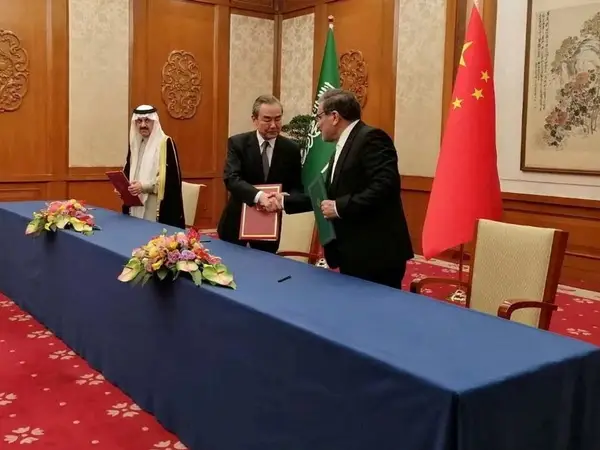Several Iranian political analysts and media commentators have welcomed the Iran-Saudi deal brokered by China to resume ties between the two countries.
Diplomatic relations between Tehran and Riyadh had been severed since January 2016 when pro-government vigilante groups attacked the Saudi embassy in Tehran and the consulate in Mashhad. Since then, many moderate state officials and media commentators were accusing the hardliners who are currently in control of the government of being behind the attacks.
Welcoming the idea of resumption of ties between the two neighbors, reformist politician Mohammad-Reza Javadi-Hesar told Etemad newspaper in Tehran on Saturday, that Iran has no way out of its current crises other than détente. He added that "Iran should welcome direct talks with the United States and Saudi Arabia."
Borrowing the expression West Asia (rather than Middle East) from Supreme Leader Khamenei, Javadi-Hesar said: "We in West Asia are holding talks withEast Asia. What is wrong with also holding talks with the power West of Europe" meaning the United States.
Sitting at the negotiating table with the United States and Saudi Arabia will prove that problems are not as big as we assumed them to be, he said. If the current Iranian government which has not been able to solve the country's economic problems does this, they can at least take credit for melting the ice of a 40-year-long impasse in Iran's foreign relations, Javadi-Hesar added.
Meanwhile, former diplomat Ghasem Mohebali, criticized Iran's Looking East policy and said in an interview with Entekhab website that "Our economic problem is the result of our relations with Europe and the United States, not our relations with China and Saudi Arabia!" Mohebali, who was referring to Western sanctions, further stressed that Tehran should strive to solve its problems with Washington. He added: "Iran cannot have permanent normal ties with any country without solving its problems with the United States."
Nonetheless, Mohebali said that "the recent agreement between Iran and Saudi Arabia gives us reasons to be optimistic about other positive developments as a result of returning to diplomacy.”
In another development, Iran's former Foreign Minister and Nuclear Chief Ali Akbar Salehi also welcomed the agreement between Riyadh and Tehran, and said in an interview with Entekhab: "The agreement with Saudi Arabia was a relatively timely event that can take us out of a deadlock." However, he noted that "this could have taken place earlier and without the intervention of mediators. In that case we would have owed nothing to no one." Salehi further hoped that both sides will remain committed to the agreement.
The agreement over the idea of resuming ties between Riyadh and Tehran has also led to other discussions on social media. Gholamreza Nouriala the editor of proreform Naghd-e Hal newspaper, harshly criticized the hardline editor of Kayhan newspaper who had called relations with Saudi Arabia "a stigma for the Islamic Iran" in 2016 after the attack on the Saudi embassy. However, in its Saturday edition, Kayhan's editor praised the resumption of ties as a “hard blow to the United States and Israel.” Nouriala called Shariatmadari a hypocrite and readers who commented on his tweet, angrily lashed out at Shariamadari.
Several other social media users posted pictures of Ali Foroughi who led the vigilante groups during the attack on Saudi diplomatic buildings in 2016 and was subsequently appointed as the manager of Channel 3 of Iran's state television which operates under Supreme Leader Ali Khamenei. One user wrote that he got a big job for leading the arsonists and will once again get a bigger job for reflecting president Raisi's "big diplomatic victor."
Tens of other Twitter users also reminded that Majles Speaker Mohammad Bagher Ghalibaf was also implicated for his role in the attack after one of the attack organizers, Hassan Kordmihan was revealed to be the chairman of his presidential election headquarters in 2017. On Friday, Ghalibaf praised the resumption of ties between Saudi Arabia and Iran as an important step to enhance the region's security.
